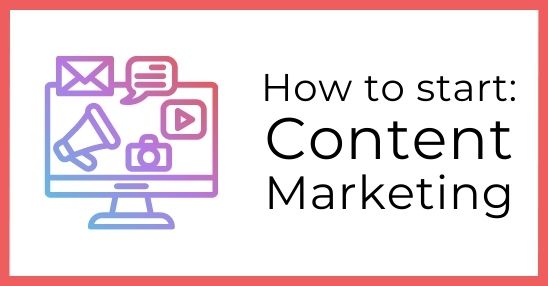
How to get started with content marketing
In this blog, we’ll take a closer look at what content marketing is, why you should consider it (regardless of the size of your business) and how to get started with content marketing.
This article is part of the Get Started Hub. Find out more about content and SEO on the overview page.
What is content marketing?
Content marketing is the practice of creating useful articles, videos, images and other content that will help your target customer audience solve a problem or learn something new. It’s about giving away valuable information for free so that people will see you as a leader in your field and want to do business with you.
Just selling your services on a service landing page is like yelling your sales talk at someone in the middle of the street, and not even near your store. There’s just not enough context for people to even consider listening, let alone buying from you.


Providing additional content that addresses your audience’s pain points can help your audience feel more informed and in turn more confident in making a decision. Your content should guide them along the buying journey, answering their questions and proving you are the expert you say you are.
Content marketing helps you establish yourself as an authority in your field or industry.
Content marketing helps you establish yourself as an authority in your field or industry. For example, let’s say that you are the owner of a local fitness studio and you start publishing content on fitness tips, such as how to get better sleep or how to stay motivated during the holiday season. Over time, people will begin to see your business as an expert on fitness-related topics—and they may even share your content with their friends and followers on social media.
When this happens, it helps you stand out from other businesses in your area who don’t have a strong online presence—and it can help you compete with larger companies that have more resources for marketing and advertising.
Content marketing gives people a reason to visit your website or social media pages.
Content marketing is the process of creating and sharing content that adds value to your audience. It encourages people to visit your website or social media pages by providing them with valuable content. This is called “pull” marketing—instead of actively chasing after potential customers through “push” marketing methods, like advertising, you’re pulling them towards you by giving them a reason to interact with your brand.
Your content should make it easy for the reader to share what they’ve read with others who might find it helpful. You can also encourage people to contact you for more information or sign up for an email newsletter so they have a reason to come back.
Content Marketing helps with SEO
 In addition to this, content marketing also helps with your website SEO. A solid blogging strategy can help your Google E-A-T profile, Expertise, Authority, and Trust; the same three things you want to show your customers. Writing for your audience will help you with the search engine robots too!
In addition to this, content marketing also helps with your website SEO. A solid blogging strategy can help your Google E-A-T profile, Expertise, Authority, and Trust; the same three things you want to show your customers. Writing for your audience will help you with the search engine robots too!
Furthermore, as you have done your audience research and know their pain points, you can do keyword research and target specific phrases that will help your audience find the answers to their detailed questions.
This will also allow users who have never heard of your products to get exposed to your brand while they are searching for this information. Showing yourself as the expert at this point will help them remember you when they are further down the buyer journey.
How to get started with content marketing
You can now find a lot of free advice online that makes it easier to create blogs, videos, and other content, including this one! With so many tools and easy-to-follow tips at your disposal, you no longer need to be an expert in any one thing. In fact, one of the most effective things you can do is to just keep writing about your business and the things on which it focuses. It’s a great way to get your expertise out there and start building up an audience.
Plus, with more people spending time online than ever before, there’s never been a better time to start creating content for them. Keep in mind that content marketing, like SEO, is a long-term strategy. You are building your authority and expertise over time (no one became an expert in a day, right?)
So even if you don’t see results right away, you have nothing to lose by getting started.
Start with blog posts and social media posts.
To help guide you on your journey, here are some tips to get you started:
- Research, research, research! Who is your audience, and what do they need to know? What key phrases can you target that fit into that?
- Set up a blog on your website. All this content needs a home, and a blog on your website is perfect for this. Take a moment to think about the blog architecture (it’s almost like a mini-site within your site after all)
- Write your blogs. Make sure they are written in a way that resonates with your audience, as they are the ones you’re trying to reach.
- Start sharing your blogs on social media. Once you have a few blog posts under your belt, publish short snippets of those blogs on social media along with a link back to the full post on your website.
- If you have an email newsletter, your blog posts are a great asset to share as a short snippet with a link back to your blog.
- Set up a content calendar to keep organised. Take some time to be strategic about which posts you’re going to write and when you will share them on social or through email newsletters. Three articles about the same topic in a row may not work, and while your service can be extra relevant around Christmas, that won’t help if you post the blog in June!
Blog posts can take any form, including written articles, videos or sound recordings. They don’t need to be long – the important thing is that they contain valuable information that will help your potential customer solve their problem.
Another approach is to start publishing content directly on social media and then use it as an opportunity to drive traffic back to your website. So instead of starting with full blog posts, look at how much time and resources you can dedicate towards creating shorter-form content (200-400 words) that will speak directly to your audience via social channels like Facebook and Instagram. The key here is not just to create any kind of content, but rather high-quality content that will resonate with them so they’ll want more!
Social media is where people spend their time while they’re online.
 Social is also a great way to get your content marketing in front of your ideal customers. The majority of people who use the internet also have at least one social media account, so you can be sure they’ll see your post if you publish it. You already know that posting regularly on social helps you build a loyal community and become more accessible to potential customers.
Social is also a great way to get your content marketing in front of your ideal customers. The majority of people who use the internet also have at least one social media account, so you can be sure they’ll see your post if you publish it. You already know that posting regularly on social helps you build a loyal community and become more accessible to potential customers.
Social media is also a great place to reach out and start conversations with your customers. Use it to ask them what they want to read, what they like about your business, and what changes would make them more likely to use you again. The more you know about who’s reading your content, the more likely you are to write content that will appeal directly to their needs—and the more likely they’ll be able to find you and keep coming back for what you have to offer.
This is why content marketing can be such a powerful tool for small businesses.
As a small business, you may find that your customers don’t know much about you or what your company offers. Content marketing helps you establish yourself as an authority in your field or industry and gives people a reason to visit your website or social media pages. Having content on your website and social media channels can also help improve your search engine rankings, which will drive more traffic to your company’s online presence.
Starting with a blog on your website isn’t only great for SEO, you can repurpose the same piece of content as social media posts and assets in your email newsletter. Through your content calendar, you will be able to get the most out of every piece of content, building trust in your brand over time.
Need some help with your content marketing? Get in touch to find out how I can support your content marketing journey.
